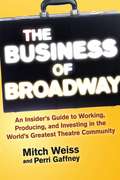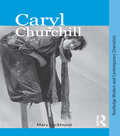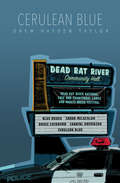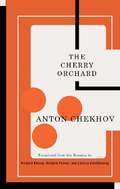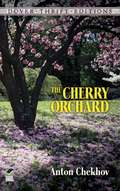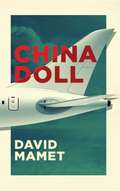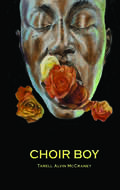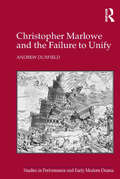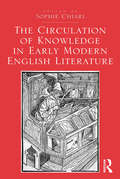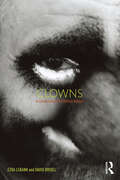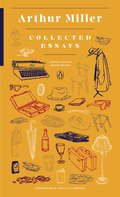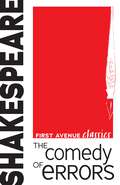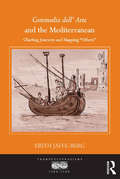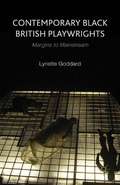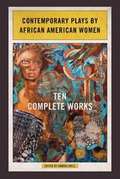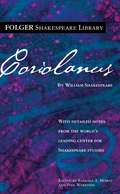- Table View
- List View
The Business of Broadway: An Insider?s Guide to Working, Producing, and Investing in the World?s Greatest Theatre Community
by Mitch Weiss Perri GaffneyNew York’s Broadway theatre scene has long been viewed as the "top of the heap” in the world theatre community. Taking lessons from the very best, this innovative guide delves into the business side of the renowned industry to explain just how its system functions. For anyone interested in pursuing a career on Broadway, or who wants to grow a theatre in any other part of the world, The Business of Broadway offers an in-depth analysis of the infrastructure at the core of successful theatre. Manager/producer Mitch Weiss and actor/writer Perri Gaffney take readers behind the scenes to reveal what the audience--and even the players and many producers--don’t know about how Broadway works, describing more than 200 jobs that become available for every show. A variety of performers, producers, managers, and others involved with the Broadway network share valuable personal experience in interviews discussing what made a show a hit or a miss, and how some of the rules, regulations, and practices that are in place today were pioneered.
Cambridge Introductions to…: The Cambridge Introduction to Theatre and Literature of the Absurd
by Michael Y. BennettMichael Y. Bennett's accessible Introduction explains the complex, multidimensional nature of the works and writers associated with the absurd - a label placed upon a number of writers who revolted against traditional theatre and literature in both similar and widely different ways. Setting the movement in its historical, intellectual and cultural contexts, Bennett provides an in-depth overview of absurdism and its key figures in theatre and literature, from Samuel Beckett and Harold Pinter to Tom Stoppard. Chapters reveal the movement's origins, development and present-day influence upon popular culture around the world, employing the latest research to this often challenging area of study in a balanced and authoritative approach. Essential reading for students of literature and theatre, this book provides the necessary tools to interpret and develop the study of a movement associated with some of the twentieth century's greatest and most influential cultural figures.
Cambridge Studies in Modern Theatre: A History of the Berliner Ensemble
by David BarnettThe Berliner Ensemble was founded by Bertolt Brecht and his wife Helene Weigel in 1949. The company soon gained international prominence, and its productions and philosophy influenced the work of theatre-makers around the world. David Barnett's book is the first study of the company in any language. Based on extensive archival research, it uncovers Brecht's working methods and those of the company's most important directors after his death. The book considers the boon and burden of Brecht's legacy and provides new insights into battles waged behind the scenes for the preservation of the Brechtian tradition. The Berliner Ensemble was also the German Democratic Republic's most prestigious cultural export, attracting attention from the highest circles of government, and from the Stasi, before it privatised itself after German reunification in 1990. Barnett pieces together a complex history that sheds light on both the company's groundbreaking productions and their turbulent times.
Cambridge Studies in the History of the People's Republic of China: Mao's Cultural Army
by Brian James DemareCharting their training, travels, and performances, this innovative study explores the role of the artists that roamed the Chinese countryside in support of Mao's communist revolution. DeMare traces the development of Mao's 'cultural army' from its genesis in Red Army propaganda teams to its full development as a largely civilian force composed of amateur and professional drama troupes in the early years of the PRC. Drawing from memoirs, artistic handbooks, and rare archival sources, Mao's Cultural Army uncovers the arduous and complex process of creating revolutionary dramas that would appeal to China's all-important rural audiences. The Communists strived for a disciplined cultural army to promote party policies, but audiences often shunned modern and didactic shows, and instead clamoured for traditional works. DeMare illustrates how drama troupes, caught between the party and their audiences, did their best to resist the ever growing reach of the PRC state.
Caryl Churchill (Routledge Modern and Contemporary Dramatists)
by Mary LuckhurstOne of Europe's greatest playwrights, Caryl Churchill has been internationally celebrated for four decades. She has exploded the narrow definitions of political theatre to write consistently hard-edged and innovative work. Always unpredictable in her stage experiments, her plays have stretched the relationships between form and content, actor and spectator to their limits. This new critical introduction to Churchill examines her political agendas, her collaborations with other practitioners, and looks at specific production histories of her plays. Churchill's work continues to have profound resonances with her audiences and this book explores her preoccupation with representing such phenomena as capitalism, genocide, environmental issues, identity, psychiatry and mental illness, parenting, violence and terrorism. It includes new interviews with actors and directors of her work, and gathers together source material from her wide-ranging career.
Celebrating Shakespeare
by Calvo, Clara and Kahn, Coppélia Clara Calvo Coppélia KahnOn the 400th anniversary of Shakespeare's death, this collection opens up the social practices of commemoration to new research and analysis. An international team of leading scholars explores a broad spectrum of celebrations, showing how key events - such as the Easter Rising in Ireland, the Second Vatican Council of 1964 and the Great Exhibition of 1851 - drew on Shakespeare to express political agendas. In the USA, commemoration in 1864 counted on him to symbolise unity transcending the Civil War, while the First World War pulled the 1916 anniversary celebration into the war effort, enlisting Shakespeare as patriotic poet. The essays also consider how the dream of Shakespeare as a rural poet took shape in gardens, how cartoons challenged the poet's élite status and how statues of him mutated into advertisements for gin and Disney cartoons. Richly varied illustrations supplement these case studies of the diverse, complex and contradictory aims of memorialising Shakespeare.
Cerulean Blue
by Drew Hayden TaylorCerulean Blue is a comedic play about a struggling blues band invited to participate in a benefit concert for a First Nation community in conflict with governmental authorities. Upon arriving, the band discovers the entire lineup of musical acts has cancelled and they're left trapped behind barricades. Complicating the matter, there is conflict within the band and the sudden appearance of an old girlfriend makes the event even more perilous. This play is an homage to fast-moving farces while also addressing Aboriginal issues. Cerulean Blue deals with relationships, perceptions, politics, and what to do when you discover you've been dating your first cousin. Add a few spoonfuls of original blues music, and you've got a fun-filled evening. The play was written for a large ensemble cast, which makes it ideal for musical theatre departments in high schools and colleges - every student can play a part. An original musical score by Andrew Clemens will be available for download from Talonbooks.com. Cast of ten women and ten men.
The Cherry Orchard
by Larissa Volokhonsky Richard Nelson Anton Chekhov Richard Pevear"Pevear and Volokhonsky are at once scrupulous translators and vivid stylists of English."--The New YorkerThere have always been two versions of Chekhov's heartrending and humorous masterwork: the one with which we are all familiar, staged by Konstatine Stanislavski at the Moscow Art Theatre in 1904, and the one Chekhov had originally envisioned. Now, for the first time, both are available and published here in a single volume in translations by the renowned playwright Richard Nelson and Richard Peavar and Larissa Volokhonsky, the foremost contemporary translators of classic Russian literature. Shedding new light on this most revered play, the translators reconstructed the script Chekhov first submitted and all of the changes he made prior to rehearsal. The result is a major event in the publishing of Chekhov's canon.Richard Nelson's many plays include Rodney's Wife, Goodnight Children Everywhere, Drama Desk-nominated Franny's Way and Some Americans Abroad, Tony Award-nominated Two Shakespearean Actors and James Joyce's The Dead (with Shaun Davey), for which he won a Tony Award for Best Book of a Musical, and the critically acclaimed, searing play cycle, The Apple Family Plays.Richard Pevear and Larissa Volokhonsky have produced acclaimed translations of Leo Tolstoy, Fyodor Dostoevsky, Nikolai Gogol, Anton Chekhov, and Mikhail Bulgakov. Their translations of The Brothers Karamazov and Anna Karenina won the 1991 and 2002 PEN/Book-of-the-Month Club Translation Prizes. Pevvear, a native of Boston, and Volokhonsjky, of St. Petersburg, are married to each other and live in Paris.
The Cherry Orchard
by Anton ChekhovThe Cherry Orchard was first produced by the Moscow Art Theatre on Chekhov's last birthday, January 17, 1904. Since that time it has become one of the most critically admired and performed plays in the Western world, a high comedy whose principal theme, the passing of the old semifeudal order, is symbolized in the sale of the cherry orchard owned by Madame Ranevsky.The play also functions as a magnificent showcase for Chekhov's acute observations of his characters' foibles and for quizzical ruminations on the approaching dissolution of the world of the Russian aristocracy and life as it was lived on their great country estates. While the subject and the characters of the work are, in a sense, timeless, the dramatic technique of the play was a Chekhovian innovation. In this and other plays he developed the concept of "indirect action," in which the dramatic action takes place off stage and the significance of the play revolves around the reactions of the characters to those unseen events.Reprinted from a standard edition, this inexpensive well-made volume invites any lover of theater or great literature to enter the world of Madame Ranevsky, Anya, Gayef, Lopakhin, Firs, and the other memorable characters whose hopes, fears, loves, and general humanity are so brilliantly depicted in this landmark of world drama.
China Doll
by David Mamet"The finest American author of his generation."--Sunday MailThis complex new work from celebrated playwright David Mamet revolves around a wealthy man, his young fiancée, and an airplane. The man has just bought a new plane as a wedding present for the girl. He intends to go into semiretirement and enjoy himself. While in the process of leaving his office, and giving last minute instructions to his young assistant, he takes one final phone call.The new, widely anticipated play premieres on Broadway this fall, starring Tony and Academy Award-winning actor Al Pacino, for whom the play was written. Pacino described the role of billionaire Mickey Ross as "one of the most daunting and challenging roles I've been given to explore in the theater" and declared, "it blew me away."David Mamet is an American playwright, director, and screenwriter whose most notable works include Glengarry Glen Ross (Pulitzer Prize for Drama), American Buffalo, Speed-the-Plow, Oleanna, November, Race, and The Anarchist. Besides the film adaptations of his plays, his major screenwriting credits include The Postman Always Rings Twice, The Verdict, Rising Sun, Wag the Dog, and Hannibal. Over the course of his prolific career, Mamet has earned Tony Award nominations, Academy Award nominations, Drama Desk Awards, and "Screenwriter of the Year" from the London Critics Circle Film Awards.
China Doll (TCG Edition)
by David Mamet"The finest American author of his generation."--Sunday MailThis complex new work from celebrated playwright David Mamet revolves around a wealthy man, his young fiancée, and an airplane. The man has just bought a new plane as a wedding present for the girl. He intends to go into semiretirement and enjoy himself. While in the process of leaving his office, and giving last minute instructions to his young assistant, he takes one final phone call.The new, widely anticipated play premieres on Broadway this fall, starring Tony and Academy Award-winning actor Al Pacino, for whom the play was written. Pacino described the role of billionaire Mickey Ross as "one of the most daunting and challenging roles I've been given to explore in the theater" and declared, "it blew me away."David Mamet is an American playwright, director, and screenwriter whose most notable works include Glengarry Glen Ross (Pulitzer Prize for Drama), American Buffalo, Speed-the-Plow, Oleanna, November, Race, and The Anarchist. Besides the film adaptations of his plays, his major screenwriting credits include The Postman Always Rings Twice, The Verdict, Rising Sun, Wag the Dog, and Hannibal. Over the course of his prolific career, Mamet has earned Tony Award nominations, Academy Award nominations, Drama Desk Awards, and "Screenwriter of the Year" from the London Critics Circle Film Awards.
Choir Boy
by Tarell Alvin Mccraney"An exhilarating, multi-layered new play."-The Guardian"Stirring and stylishly told . . . McCraney's crispest and most confident work."-Daily News"Greatly affecting. . . . It takes a brave writer to set his language against the plaintive beauty of the hymns and spirituals . . . but McCraney's speech holds its own, locating poetry even in casual vernacular and again demonstrating his gift for simile and metaphor."-The Village VoiceThe Charles R. Drew Prep School for Boys is dedicated to the creation of strong, ethical black men. Pharus wants nothing more than to take his rightful place as leader of the school's legendary gospel choir, but can he find his way inside the hallowed halls of this institution if he sings in his own key? Known for his unique brand of urban lyricism, Tarrell Alvin McCraney follows up his acclaimed trilogy The Brother/Sister Plays with this affecting portrait of a gay youth trying to find the courage to let the truth about himself be known. Set against the sorrowful sounds of hymns and spirituals, Choir Boy premiered at the Royal Court in London before receiving its Off-Broadway premiere in summer 2013 to critical and popular acclaim.Tarell Alvin McCraney is author of The Brother/Sister Plays: The Brothers Size, In the Red and Brown Water, and Marcus; Or the Secret of Sweet. Other works include Wig Out!, set in New York's drag clubs, and The Breach, which deals with the aftermath of Hurricane Katrina. His awards include the 2009 Steinberg Playwrights Award and the Paula Vogel Playwriting Award.
Choir Boy
by Tarell Alvin Mccraney"An exhilarating, multi-layered new play."-The Guardian"Stirring and stylishly told . . . McCraney's crispest and most confident work."-Daily News"Greatly affecting. . . . It takes a brave writer to set his language against the plaintive beauty of the hymns and spirituals . . . but McCraney's speech holds its own, locating poetry even in casual vernacular and again demonstrating his gift for simile and metaphor."-The Village VoiceThe Charles R. Drew Prep School for Boys is dedicated to the creation of strong, ethical black men. Pharus wants nothing more than to take his rightful place as leader of the school's legendary gospel choir, but can he find his way inside the hallowed halls of this institution if he sings in his own key? Known for his unique brand of urban lyricism, Tarrell Alvin McCraney follows up his acclaimed trilogy The Brother/Sister Plays with this affecting portrait of a gay youth trying to find the courage to let the truth about himself be known. Set against the sorrowful sounds of hymns and spirituals, Choir Boy premiered at the Royal Court in London before receiving its Off-Broadway premiere in summer 2013 to critical and popular acclaim.Tarell Alvin McCraney is author of The Brother/Sister Plays: The Brothers Size, In the Red and Brown Water, and Marcus; Or the Secret of Sweet. Other works include Wig Out!, set in New York's drag clubs, and The Breach, which deals with the aftermath of Hurricane Katrina. His awards include the 2009 Steinberg Playwrights Award and the Paula Vogel Playwriting Award.
Christopher Marlowe and the Failure to Unify (Studies in Performance and Early Modern Drama)
by Andrew DuxfieldIn this sustained full length study of Marlowe's plays, Andrew Duxfield argues that Marlovian drama exhibits a marked interest in unity and unification, and that in doing so it engages with a discourse of anxiety over social discord that was prominent in the 1580s and 1590s. In combination with the ambiguity of the plays, he suggests, this focus produces a tension that both heightens dramatic effect and facilitates a cynical response to contemporary evocations of and pleas for unity. This book has three main aims. Firstly, it establishes that Marlowe’s tragedies exhibit a profound interest in the process of reduction and the ideal of unity. Duxfield shows this interest to manifest itself in different ways in each of the plays. Secondly, it identifies this interest in unity and unification as an engagement in a cultural discourse that was particularly prevalent in England during Marlowe’s writing career; during the late 1580s and early 1590s heightened inter-confessional tension, the threat and reality of foreign invasion and public puritan dissent in the form of the Marprelate controversy provoked considerable public anxiety about social discord. Thirdly, the book considers the plays’ focus on unity in relation to their marked ambiguity; throughout all of the plays, unifying ideals and reductive processes are consistently subject to renegotiation with, or undercut entirely by, the complexity and ambiguity of the dramas in which they feature. Duxfield’s focus on unity as a theme throughout the plays provides a new lens through which to examine the place of Marlowe’s work in its cultural moment.
The Circulation of Knowledge in Early Modern English Literature
by Sophie ChiariWith its many rites of initiation (religious, educational, professional or sexual), Elizabethan and Jacobean education emphasized both imitation and discovery in a struggle to bring population to a minimal literacy, while more demanding techniques were being developed for the cultural elite. The Circulation of Knowledge in Early Modern English Literature examines the question of transmission and of the educational procedures in16th- and 17th-century England by emphasizing deviant practices that questioned, reassessed or even challenged pre-established cultural norms and traditions. This volume thus alternates theoretical analyses with more specific readings in order to investigate the multiple ways in which ideas then circulated. It also addresses the ways in which the dominant cultural forms of the literature and drama of Shakespeare’s age were being subverted. In this regard, its various contributors analyze how the interrelated processes of initiation, transmission and transgression operated at the core of early modern English culture, and how Christopher Marlowe, William Shakespeare and Thomas Middleton, or lesser known poets and playwrights such as Thomas Howell, Thomas Edwards and George Villiers, managed to appropriate these cultural processes in their works.
Clowns: In conversation with modern masters
by Ezra LeBank David BridelClowns: In Conversation with Modern Masters is a groundbreaking collection of conversations with 20 of the greatest clowns on earth. In discussion with clown aficionados Ezra LeBank and David Bridel, these legends of comedy reveal the origins, inspirations, techniques, and philosophies that underpin their remarkable odysseys. Featuring incomparable artists, including Slava Polunin, Bill Irwin, David Shiner, Oleg Popov, Dimitri, Nola Rae, and many more, Clowns is a unique and definitive study on the art of clowning. In Clowns, these 20 master artists speak candidly about their first encounters with clowning and circus, the crucial decisions that carved out the foundations of their style, and the role of teachers and mentors who shaped their development. Follow the twists and turns that changed the direction of their art and careers, explore the role of failure and originality in their lives and performances, and examine the development and evolution of the signature routines that became each clown’s trademark. The discussions culminate in meditations on the role of clowning in the modern world, as these great practitioners share their perspectives on the mysterious, elusive art of the clown.
Collected Essays (Penguin Classics)
by Arthur Miller Susan C. AbbotsonThe collected essays of the "moral voice of [the] American stage" (The New York Times) in a Penguin Classics Deluxe Edition Arthur Miller was not only one of America's most important twentieth-century playwrights, but he was also one of its most influential literary, cultural, and intellectual voices. Throughout his career, he consistently remained one of the country's leading public intellectuals, advocating tirelessly for social justice, global democracy, and the arts. Theater scholar Susan C. W. Abbotson introduces this volume as a selection of Miller's finest essays, organized in three thematic parts: essays on the theater, essays on specific plays like Death of a Salesman and The Crucible, and sociopolitical essays on topics spanning from the Depression to the twenty-first century. Written with playful wit, clear-eyed intellect, and above all, human dignity, these essays offer unmatched insight into the work of Arthur Miller and the turbulent times through which he guided his country. For more than seventy years, Penguin has been the leading publisher of classic literature in the English-speaking world. With more than 1,700 titles, Penguin Classics represents a global bookshelf of the best works throughout history and across genres and disciplines. Readers trust the series to provide authoritative texts enhanced by introductions and notes by distinguished scholars and contemporary authors, as well as up-to-date translations by award-winning translators.From the Trade Paperback edition.
The Comedy of Errors (First Avenue Classics ™)
by William ShakespeareThe merchant Egeon is caught crossing the border from Syracuse into the rival city of Ephesus—a crime punishable by death. But Egeon isn't a criminal; he's merely trying to find his wife and one of his twin sons, who were separated from him after a shipwreck twenty-five years ago. The Duke takes pity on Egeon after hearing his story and grants him a day to raise the money necessary to save his life. What Egeon isn't aware of is that both of his twin sons are now in Ephesus, and with two identical sons in one city, strange mix-ups are bound to happen. A tale of mistaken identities, this unabridged version of one of English playwright William Shakespeare's earliest comedic plays was first performed in 1594 and published in Shakespeare's First Folio in 1623.
Comic Acting and Portraiture in Late-Georgian and Regency England
by Jim DavisThe popularity of the comic performers of late-Georgian and Regency England and their frequent depiction in portraits, caricatures and prints is beyond dispute, yet until now little has been written on the subject. In this unique study Jim Davis considers the representation of English low comic actors, such as Joseph Munden, John Liston, Charles Mathews and John Emery, in the visual arts of the period, the ways in which such representations became part of the visual culture of their time, and the impact of visual representation and art theory on prose descriptions of comic actors. Davis reveals how many of the actors discussed also exhibited or collected paintings and used painterly techniques to evoke the world around them. Drawing particularly on the influence of Hogarth and Wilkie, he goes on to examine portraiture as critique and what the actors themselves represented in terms of notions of national and regional identity.
Commedia dell' Arte and the Mediterranean: Charting Journeys and Mapping 'Others' (Transculturalisms, 1400-1700)
by Erith Jaffe-BergDrawing on published collections and also manuscripts from Mantuan archives, Commedia dell' arte and the Mediterranean locates commedia dell' arte as a performance form reflective of its cultural crucible in the Mediterranean. The study provides a broad perspective on commedia dell’ arte as an expression of the various cultural, gender and language communities in Italy during the early-modern period, and explores the ways in which the art form offers a platform for reflection on power and cultural exchange. While highlighting the prevalence of Mediterranean crossings in the scenarios of commedia dell' arte, this book examines the way in which actors embodied characters from across the wider Mediterranean region. The presence of Mediterranean minority groups such as Arabs, Armenians, Jews and Turks within commedia dell' arte is marked on stage and 'backstage' where they were collaborators in the creative process. In addition, gendered performances by the first female actors participated in 'staging' the Mediterranean by using the female body as a canvas for cartographical imaginings. By focusing attention on the various communities involved in the making of theatre, a central preoccupation of the book is to question the dynamics of 'exchange' as it materialized within a spectrum inclusive of both cultural collaboration but also of taxation and coercion.
Contemporary Black British Playwrights
by Lynette GoddardThis book examines the socio-political and theatrical conditions that heralded the shift from the margins to the mainstream for black British Writers, through analysis of the social issues portrayed in plays by Kwame Kwei-Armah, debbie tucker green, Roy Williams, and Bola Agbaje.
Contemporary Black British Playwrights: Margins to Mainstream
by L. GoddardThis book examines the socio-political and theatrical conditions that heralded the shift from the margins to the mainstream for black British Writers, through analysis of the social issues portrayed in plays by Kwame Kwei-Armah, debbie tucker green, Roy Williams, and Bola Agbaje.
Contemporary Plays by African American Women: Ten Complete Works
by Sandra AdellAfrican American women have increasingly begun to see their plays performed from regional stages to Broadway. Yet many of these artists still struggle to gain attention. In this volume, Sandra Adell draws from the vital wellspring of works created by African American women in the twenty-first century to present ten plays by both prominent and up-and-coming writers. Taken together, the selections portray how these women engage with history as they delve into--and shake up--issues of gender and class to craft compelling stories of African American life. Gliding from gritty urbanism to rural landscapes, these works expand boundaries and boldly disrupt modes of theatrical representation. Selections: Blue Door , by Tanya Barfield; Levee James , by S. M. Shephard-Massat; Hoodoo Love , by Katori Hall; Carnaval , by Nikkole Salter; Single Black Female , by Lisa B. Thompson; Fabulation, or The Re-Education of Undine , by Lynn Nottage; BlackTop Sky , by Christina Anderson; Voyeurs de Venus , by Lydia Diamond; Fedra , by J. Nicole Brooks; and Uppa Creek: A Modern Anachronistic Parody in the Minstrel Tradition , by Keli Garrett.
Coriolanus
by William Shakespeare Paul Werstine Dr Barbara MowatSet in the earliest days of the Roman Republic, Coriolanus begins with the common people, or plebeians, in armed revolt against the patricians. The people win the right to be represented by tribunes. Meanwhile, there are foreign enemies near the gates of Rome. The play explores one reason that Rome prevailed over such vulnerabilities: its reverence for family bonds. Coriolanus so esteems his mother, Volumnia, that he risks his life to win her approval. Even the value of family, however, is subordinate to loyalty to the Roman state. When the two obligations align, the combination is irresistible. Coriolanus is so devoted to his family and to Rome that he finds the decision to grant the plebians representation intolerable. To him, it elevates plebeians to a status equal with his family and class, to Rome's great disadvantage. He risks his political career to have the tribunate abolished--and is banished from Rome. Coriolanus then displays an apparently insatiable vengefulness against the state he idolized, opening a tragic divide within himself, pitting him against his mother and family, and threatening Rome's very existence. The authoritative edition of Coriolanus from The Folger Shakespeare Library, the trusted and widely used Shakespeare series for students and general readers, is now available as an eBook. Features include: · The exact text of the printed book for easy cross-reference · Hundreds of hypertext links for instant navigation · Freshly edited text based on the best early printed version of the play · Full explanatory notes conveniently placed on pages facing the text of the play · Scene-by-scene plot summaries · A key to famous lines and phrases · An introduction to reading Shakespeare's language · Illustrations from the Folger Shakespeare Library's vast holdings of rare books · An essay by a leading Shakespeare scholar providing a modern perspective on the play
Costume in the Comedies of Aristophanes
by Gwendolyn Compton-EngleThis book offers an interpretation of the handling of costume in the plays of the fifth-century comic poet Aristophanes. Drawing on both textual and material evidence from the fourth- and fifth-century Greek world, it examines three layers of costume: the bodysuit worn by the actors, the characters' clothes, and the additional layering of disguise. A chapter is also devoted to the inventive costumes of the comic chorus. Going beyond describing what costumes looked like, the book focuses instead on the dynamics of costume as it is manipulated by characters in the performance of plays. The book argues that costume is used competitively, as characters handle each other's costumes and poets vie for status using costume. This argument is informed by performance studies and by analyses of gender and the body.
